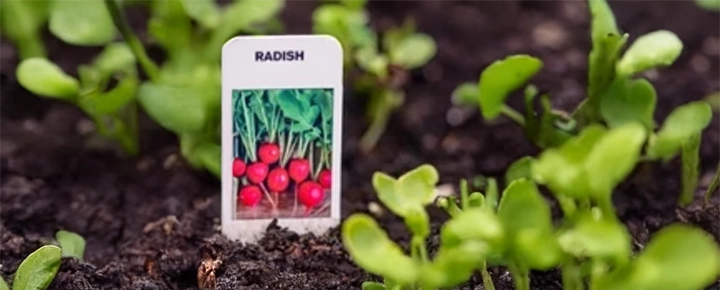
Plastic plant tags are a must-have for keeping your garden organized and thriving. Whether you’re growing vegetables, flowers, or herbs, the right plant markers help you identify plants, track their growth, and provide key care instructions.
With custom plant tags, you can tailor each label to suit specific plants, ensuring they meet your garden’s unique needs. Here are five examples of plastic plant tags designed for particular plants, complete with ideas for what to include and how the tags might look.
1. Herbs: Compact Tags with Care Tips
Herbs like basil, cilantro, and rosemary are garden staples, but keeping track of them can be tricky—especially in small pots or raised beds. For these plants, use compact plastic garden markers that include:
- Plant name (e.g., “Basil” or “Rosemary”).
- Sunlight needs (e.g., “Full Sun”).
- Watering frequency (e.g., “Water every 2-3 days”).
Design Tip:
Opt for small, durable custom plant markers with a simple design that fits neatly in pots or herb gardens. A pop of green on the tag can give it a fresh, herb-inspired look.
2. Tomatoes: Durable Tags with Planting Dates
Tomatoes are sun-loving, fast-growing plants that benefit from detailed tags to track their care. Plastic tags for tomatoes should include:
- Plant name (e.g., “Roma Tomato”).
- Planting date (to track growth).
- Fertilizing reminders (e.g., “Fertilize every 2 weeks”).
Design Tip:
Use medium-sized plastic tags with a bold, legible font. Red or yellow accents can help the tags stand out in a sunny garden bed.
3. Lettuce: Waterproof Tags for Moisture-Rich Gardens
Lettuce and other leafy greens require constant watering, so waterproof plastic plant markers are essential. These tags should include:
- Plant name (e.g., “Butterhead Lettuce”).
- Harvest time (e.g., “Ready in 45 days”).
- Spacing notes (e.g., “Space plants 6 inches apart”).
Design Tip:
Choose white, waterproof custom plant tags with a smooth surface for clear printing. A clean and minimalist design keeps the focus on functionality.
4. Roses: Elegant Tags for Visual Appeal
People prize roses for their beauty, and their tags should reflect that while providing essential care details. Include:
- Rose variety (e.g., “Climbing Rose”).
- Pruning schedule (e.g., “Prune in early spring”).
- Ideal conditions (e.g., “Full Sun, Well-Drained Soil”).
Design Tip:
Use taller plastic garden plant markers with an elegant design. Soft pink or beige borders complement the aesthetic of rose gardens beautifully.
5. Fruit Trees: Hanging Tags with Key Information
Fruit trees like apple and peach trees need larger, flexible tags that can be tied to branches. These tags should include:
- Tree variety (e.g., “Fuji Apple”).
- Planting date.
- Expected harvest time (e.g., “Harvest in late summer”).
Design Tip:
Use rectangular hanging plastic garden markers with pre-punched holes for string or wire. A bright green or yellow color scheme helps the tags stand out among branches.
Help Keep Your Garden Organized
From herbs to fruit trees, the right plastic plant tags can make all the difference in organizing your garden and providing your plants with proper care. Tailored custom plant markers allow you to create a professional, polished look that meets your garden’s needs.
Ready to organize your garden with reliable, long-lasting tags? Check out our custom plant tags to find the perfect solution for your plants.
FAQs
1. Which 3 things should be on a plant care tag?
A plant care tag should include:
- The plant’s name (common or scientific).
- Sunlight requirements (e.g., full sun, partial shade).
- Watering instructions (e.g., frequency and amount).
2. What information should be included on a retail plant tag?
Retail plant tags typically include:
- Plant name and description.
- Care instructions (light, water, soil preferences).
- Planting or blooming season.
3. What does SP mean on a plant tag?
“SP” stands for “species” and indicates that the exact plant variety is unspecified.
4. How do I label plants for a garden?
Use plastic plant markers that are waterproof and UV-resistant. Include the plant name and essential care information, and place the tag securely in the soil or attach it to the plant.
5. Are plastic plant tags recyclable?
Some plastic plant tags are recyclable, especially if made from recyclable materials. Choose durable tags that you can reuse for multiple growing seasons to reduce waste.